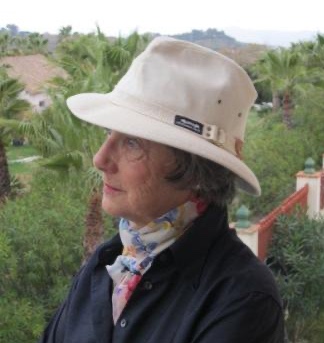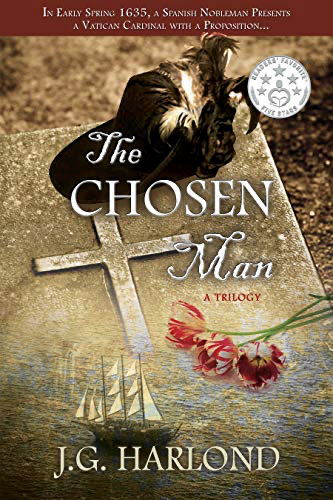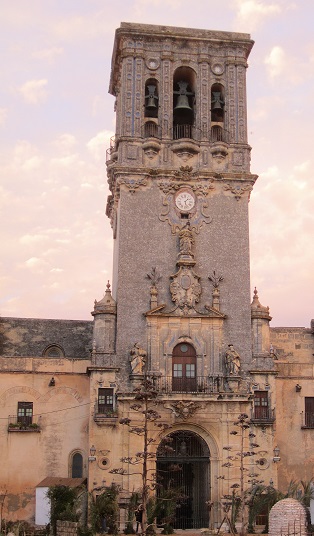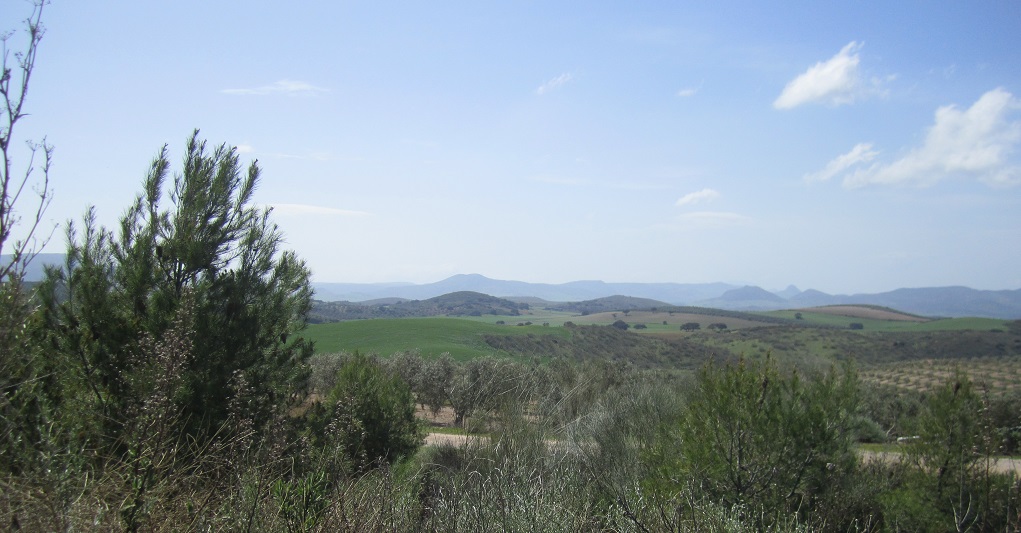 This week’s writer abroad is Jane Harlond, writing as J.G. Harlond. An award-winning author of page-turning historical crime novels set in the 17th and early 20th centuries, Jane weaves fictional characters into real events. Creator of the wily charismatic rogue Ludo da Portovenere and the aging wartime detective Bob Robbins, her stories feature wicked wrongdoing and challenging romances.
This week’s writer abroad is Jane Harlond, writing as J.G. Harlond. An award-winning author of page-turning historical crime novels set in the 17th and early 20th centuries, Jane weaves fictional characters into real events. Creator of the wily charismatic rogue Ludo da Portovenere and the aging wartime detective Bob Robbins, her stories feature wicked wrongdoing and challenging romances.
Originally from North Devon in the English West Country, Jane has travelled widely and is now settled in rural Andalucía, Spain. She’s a member of the British Crime Writers’ Association and author of The Bob Robbins Home Front Mysteries, The Chosen Man Trilogy, The Empress Emerald, Dark Night, Black Horse and The Doomsong Sword
Over to Jane!
After travelling widely, for the past 15 years we have been settled in a rural area of southern Spain. Being married to a Spanish naval officer, whose family home was built in 1720, means my lifestyle is more Latin than British. Although after so many moves, I’m an exile everywhere these days – even England. This means moments of sadness and nostalgia, but for a writer it has advantages.
Seeing one’s surroundings with an objective eye can lead to a deeper awareness of both culture and the natural environment.Here are two scenes from The Empress Emerald that show what I mean. In the first extract, a naïve Cornish girl named Davina arrives at her husband’s family home in Jerez. It is 1920 in the story, what happens, though, is fictionalised from my own arrival in the late 1980s.
The driver stopped the car outside two vast doors, blackened with age and reinforced with iron. They reminded Davina of an illustration in one of her big picture books: Bluebeard’s castle. As if by some sinister magic, a door swung open. Alfonso ushered her into a fern-infested patio. It smelt dank and uninviting. She looked up and around her. The patio was open to the sky, but on all four sides above there were windows. She sensed watching eyes and lowered her gaze.
(Not wishing to reveal family secrets, I’ll leave you to guess how long it took for a foreign Protestant divorcee to be accepted into a real-life, very Roman Catholic household.)
The second scene is set in the bandalero country between Jerez and the coast – rolling hills with giant granite boulders and secret caves. Snow-covered in winter, burnt dry in summer, apart from the constant, aggressive wind all you can hear is the cry of eagles. I love the wildness here, the chance to escape civilisation. In the not-too-distant past, it was infamous for its mounted robbers, brigands with leather satchels slung across their shoulders en bandolera – hence the name. Davina is targeted by two of these ruffians during her escape from Jerez. She kills one using a toadskin melon as a weapon – which just goes to show that this debut novel was not autobiographical. Here’s where Davina considers her surroundings. She and her stepson Sito are travelling to Gibraltar in a cart pulled by a mule called Liberty.
Sito moved the mule out into the clearing to graze and tied her to a tree stump. Liberty pulled at tussocks of grass and set larks and goldfinches bounding up around them. Then the boy set the cart to rights and began the task of sorting out the mule’s harness. Davina collected the remains of their breakfast, climbed onto the running-board and stowed the food bag next to her carpet bag under their hard wooden seat. Suddenly Sito leapt up beside her as a group wild boar grunted out of the trees around them. The mule snorted and shot to the length of her tether.
‘That was lucky,’ he said. ‘You wouldn’t want to be on the ground with them so close.’
‘Are they that dangerous?’ laughed Davina, somewhat taken aback by their size and fearsome tusks. ‘I didn’t know they were so big.’
‘Big and nasty. Don’t you have them in England?’
‘I think there used to be – like bears and wolves – but not anymore.’
The group of tusked boar shuffled off and Sito jumped back down on the ground. ‘Are you happy to be are going back?’ he said.
Davina looked around at her surroundings: clumps of low scraggy bushes, peppery smelling herbs, in the distance, trees marched across a grey pink horizon. The sky over Spain always seemed so much bigger than over England. She tried to visualise a Cornish sunrise. ‘I think I am . . .’
From the balcony of my study, I can see the mauve-shaded Sierra de las Nieves, where the Moors of Al-Ándalus harvested snow to keep medicines cool. Beyond, lies the coastline once prey to the Barbary corsairs featured in The Chosen Man Trilogy. This view is very conducive to time travel: pretend there’s no road nearby and you could be back in any century you choose.
The glass doors will be closed soon, shutters lowered to keep out the heat. Like much of Spain, Andalucía is a characterised by extremes: baking hot in summer; bone-chilling cold in tiled-floored homes in winter. Climate undoubtedly conditions culture and behaviour. Tolerance, for example, is hard to come by when temperatures reach 40 degrees Celsius. Neighbours can easily become enemies after sleepless summer nights. Something I tried to summarise in Dark Night, Black Horse, a novella based on the true story of how a small boy rescued (or stole) a wonderful black stallion during the Civil War in Coín.
Landscape and society, the weather and history – real and imagined . . . they all come together when I sit down to write. There is no question that being a foreigner in this part of Spain contributes to my writing.
————-
Connect with Jane
Web page: https://www.jgharlond.com
Blog: Reading & Writing: https://wp-harlond.jgharlond.com/
Facebook author page: https://www.facebook.com/JaneGHarlond
Twitter: https://twitter.com/JaneGHarlond @janeGHarlond
Jane’s Amazon page: https://www.amazon.com/J.-G.-Harlond/e/B007PDA1Z4
————-
Read The Chosen Man
 Rome 1635. As Flanders braces for another long year of war, a Spanish count presents the Vatican with a means of disrupting the Dutch rebels’ booming economy.
Rome 1635. As Flanders braces for another long year of war, a Spanish count presents the Vatican with a means of disrupting the Dutch rebels’ booming economy.
His plan is brilliant. They just need the right man to implement it.
Enter Ludovico da Portovenere, a charismatic spice and silk merchant. Intrigued by the Vatican’s proposal – and hungry for profit – Ludo sets off for Amsterdam. His voyage is interrupted, first by a timid English priest with a message from Rome, then by a storm, then by a pirate raid. The storm brings him a quick-witted young admirer he uses as a spy. The pirate raid brings him a girl, Alina, who won’t go home.
Each development has significant consequences for Ludo’s plans and even greater ones for the people he is involved with.
Set in a world of international politics and domestic intrigue, The Chosen Man spins an engrossing tale about the Dutch financial scandal known as tulip mania—and how decisions made in high places can have terrible repercussions on innocent lives.
Buy the book here: http://getbook.at/TheChosenMan
Alison Morton is the author of Roma Nova thrillers – INCEPTIO, CARINA (novella), PERFIDITAS, SUCCESSIO, AURELIA, NEXUS (novella), INSURRECTIO and RETALIO, and ROMA NOVA EXTRA, a collection of short stories. Audiobooks are available for four of the series. Double Identity, a contemporary conspiracy, starts a new series of thrillers.
Find out more about Roma Nova, its origins, stories and heroines and taste world the latest contemporary thriller Double Identity… Download ‘Welcome to Alison Morton’s Thriller Worlds’, a FREE eBook, as a thank you gift when you sign up to Alison’s monthly email newsletter. You’ll also be among the first to know about news and book progress before everybody else, and take part in giveaways.















Leave a Reply